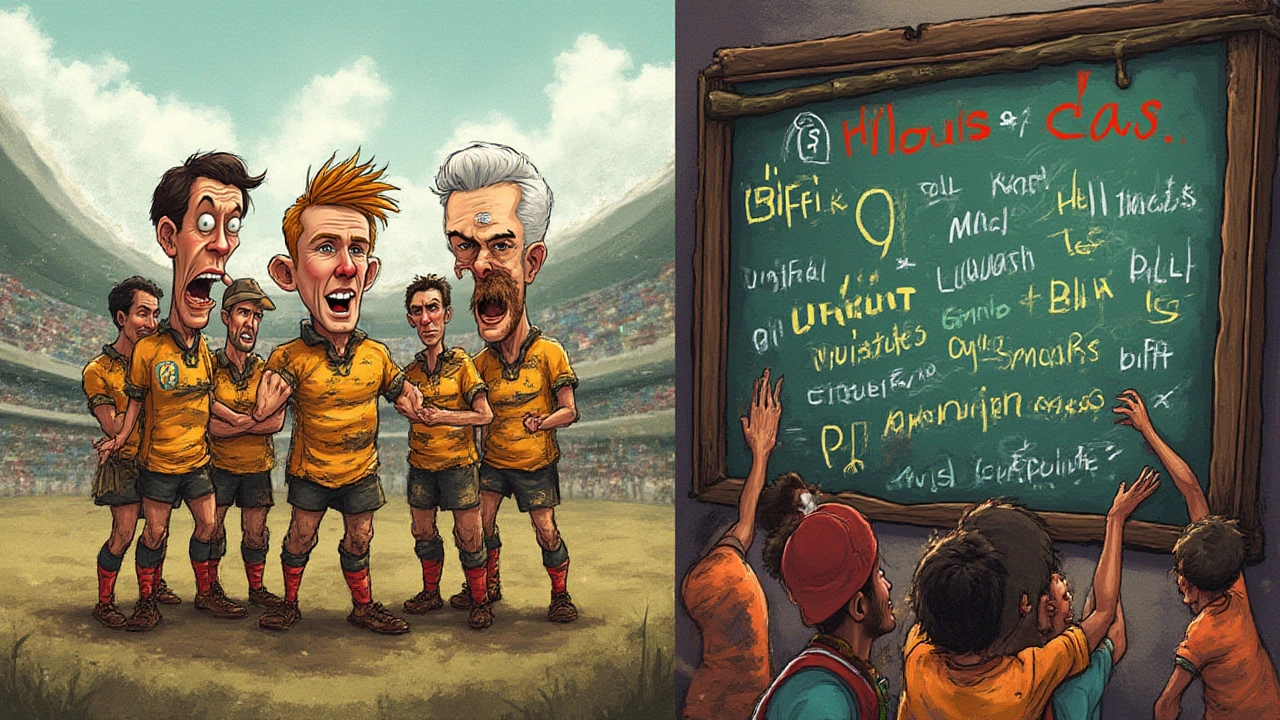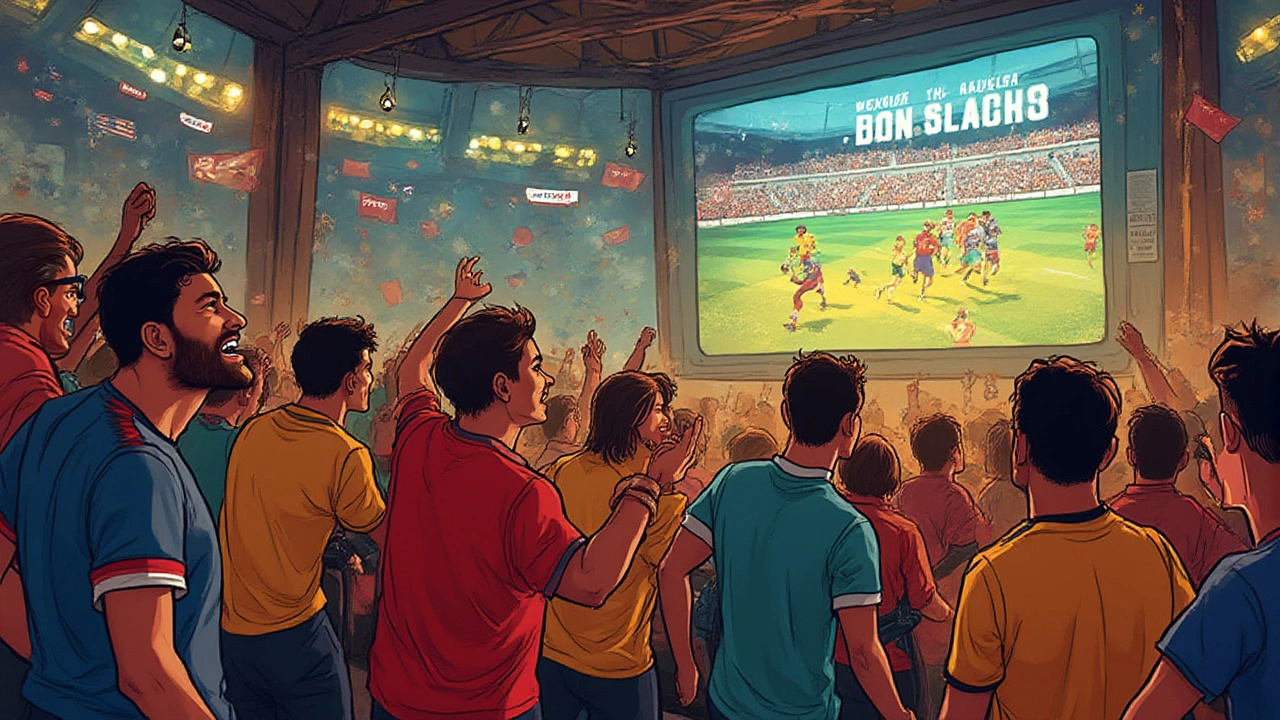If you ever hang around an Aussie sports bar or tune into Australian TV, you'll catch some language that just doesn’t add up—at least if you’re not from Down Under. Ask an Australian about rugby, and you might get a look of confusion, a cheeky laugh, or a rapidly delivered lesson on what’s what. Not all rugby is called the same thing here, and Aussies have their own lingo that splits the game in two and tosses in slang for extra spice. Why does one game get called by three names? Why does asking about “rugby” sometimes send you into a debate? The truth ties into Australia’s sporting culture, history, and a fondness for abbreviating everything. Let’s break it all down as simply (and honestly) as your mate from Sydney would over a pint.
How Australians Talk About Rugby: A Split Between Codes
Walk into a pub in New South Wales or Queensland and mention "rugby," and you’re stepping into a verbal minefield. In Australia, there are two main codes: Rugby Union and Rugby League. Outsiders often lump them together, but ask an Aussie, and you’ll soon learn they couldn’t be more different in the minds of locals. Here’s the basics: Rugby Union is the older form, the kind that’s played in Europe and at the World Cup. Rugby League, meanwhile, developed in the 1890s out of a rift about paying players, and it found its spiritual home in Australia, especially on the country’s east coast.
Now, in New South Wales and Queensland, when people say “rugby,” they probably mean Rugby League unless they say otherwise. Everyone else, when talking about Rugby Union, will just call it “Union.” And if you mention “League” without specifying, they usually know you mean Rugby League. So if you hear a passionate debate about "League vs. Union," they're not just being picky—it’s a serious distinction. It's like confusing Coke for Pepsi in Atlanta; you just don’t do it around the locals.
But things get murkier. Across Australia, “rugby” can mean either code, depending on the context, who’s talking, and where you are. In the southern states—like Victoria or South Australia—rugby isn't as dominant; here, “footy” is reserved for Australian Rules Football (AFL), not rugby at all. That’s where some casual confusion starts to seep in, especially for travelers or new residents trying to fit in and sound local.
Adding fuel to the fire is the Aussie love of shrinking words and giving everything a nickname. Instead of “Rugby League,” you’ll hear “League” or even “the footy” in places where League dominates, like Sydney. For Rugby Union fans, it’s often just "Union," but older generations might call it "rugby," plain and simple. Former Wallaby Nick Farr-Jones once joked that the name game in Australia is trickier than the sport itself, and he’s not exaggerating. The takeaway: learn your state, know your code, and never assume that “rugby” means the same thing everywhere in Oz.
From Footy to League: Aussie Slang and Its Sporting Roots
Why all the fuss about what to call a sport? It comes down to pride, history, and the Australian habit of giving things a twist. People here call McDonald’s “Macca’s,” and sunglasses “sunnies,” so you know they’re not going to leave sport untouched. But sporting slang in Australia does more than just shorten names; it broadcasts where you’re from and what you follow.
Let’s talk about “footy.” In Sydney and Brisbane, “footy” usually means Rugby League—unless it’s Rugby Union season, in which case it could mean “Union.” But stroll down to Melbourne, and “footy” means AFL. According to the 2023 National Sports Language Survey, 37% of Australians use the word “footy” for different sports depending on region, and almost every Aussie can recognize the context after just a sentence or two.
Now, the term “League” is shorthand for Rugby League and is a badge of honor for those who follow the NRL (National Rugby League). The NRL Grand Final in 2022 raked in nearly 4 million TV viewers, with fans referring to it almost exclusively as “the League” or “the footy.” Rugby Union has its loyal followers, too, especially around the ACT (Australian Capital Territory) and in private school circles, with their own competitions like the Super Rugby Pacific and the prestigious Bledisloe Cup clashes against New Zealand.
So how do Aussies actually name-check the code, especially in conversation? Here’s what you might hear:
- "Are you watching the rugby this weekend?" (In Sydney, probably League. In Canberra, probably Union.)
- "The footy’s on!" (Sydney: League. Melbourne: AFL. Perth: could be either WAFL or Rugby League.)
- "You going to the Union game?" (Definitely Rugby Union.)
- "Got your tickets for League finals?" (Straight to Rugby League.)
- "Who’s your team in the NRL?" (Rugby League again.)
To an outsider, it sounds like coded language, but to locals, it's just how things roll. This way, fans quickly find their tribe and sidestep any awkward mix-ups.

Why Do Aussies Split Rugby? Historical Shake-Ups and Fierce Loyalties
Australia’s divide between Rugby Union and Rugby League isn’t just a quirk of language; it runs deep thanks to a split over money, class, and regional pride. Rugby Union arrived first, tracing its roots in Australia back to the late 1800s. But as the sport grew, disagreements over player payments flared up. Rugby Union wanted to stay amateur; Rugby League was born out of working-class players demanding compensation for injuries and time off work. That’s why League has become the working-class hero in places like Sydney and Brisbane, while Union clings tightly to private school traditions and an international flavor.
The split led to different competitions, club loyalties, and state rivalries. Today, there are over 170,000 registered Rugby League players and more than 85,000 registered Rugby Union players in Australia, according to the Australian Sports Commission’s 2024 participation report. Each code has its own famous teams: the Kangaroos (League), the Wallabies (Union), the Maroons and Blues of State of Origin (League), the Brumbies and Waratahs (Union). The tribalism even seeps into schools, where League and Union are markers of community identity as much as sport.
It’s gotten to the point where asking someone their code is a shorthand for knowing not just what they watch but, sometimes, even where they’re from or how they grew up. During June and July, League fans rally around the State of Origin series—a huge clash between New South Wales and Queensland that grips the east coast. Meanwhile, Union gets its time to shine with the Wallabies taking on international heavyweights like the All Blacks during the Rugby Championship.
This rivalry isn’t going away. If anything, the two codes have become more fiercely proud, with their own songs, traditions, and season highlights. If you want data, check the 2023 Nielsen National Sports Survey: Rugby League had the highest TV ratings of any winter code in Eastern Australia, but Rugby Union took the prize for most international matches played. Understanding the history helps you figure out why Australians are so sensitive about rugby names and why mixing them up might spark friendly banter or flat-out disagreement.
How to Speak Aussie Rugby: Tips for Newcomers and Sounding Like a Local
If you’re new to Australia, you don’t want to sound like a lost tourist or get stuck in a long pub debate about sports codes. The easiest way to fit in? Learn the local rugby slang and check your location before talking sport. Here’s a quick guide to sounding like you belong:
- Listen first: See what others call the game. If everyone around you says “League,” don’t insist on “Union” unless you like starting arguments.
- Know the codes: NRL is always Rugby League. Super Rugby and internationals are Rugby Union.
- Don’t use “football” unless you mean soccer. “Footy” means different things based on where you are—ask before assuming!
- Brush up on key teams: Say “Roosters” or “Rabbitohs,” and you’re talking League. Mention “Waratahs” or “Brumbies,” and that’s Union territory.
- Join the chat: Ask locals about their favorite team or best live match. Aussies love sharing stories about State of Origin, the Bledisloe, or classic local derbies.
To seal the deal, here’s a quick comparison table you can use next time you need to decode a conversation about “rugby” in Australia:
| Term | Meaning (NSW/QLD) | Meaning (VIC/SA/WA) |
|---|---|---|
| Rugby | Usually Rugby League | Rugby Union or general code |
| Footy | Rugby League | AFL |
| League | Rugby League | Sometimes Rugby League |
| Union | Rugby Union | Rugby Union |
| Football | Soccer | Soccer |
One final tip: Aussies love it when you have a go. If you’re not sure, just ask what game’s on. Most locals will happily explain and might even buy you a beer for being a good sport. After all, the real secret isn’t just learning the words—it’s joining the fun of the world’s friendliest sporting rivalry. Even my dog Apollo can tell when footy’s on the telly—he stands right in front of the screen, tail wagging for League, sitting quietly for Union. You can’t fake that kind of local knowledge, but give it time, and you’ll fit right in no matter what they call the game.
